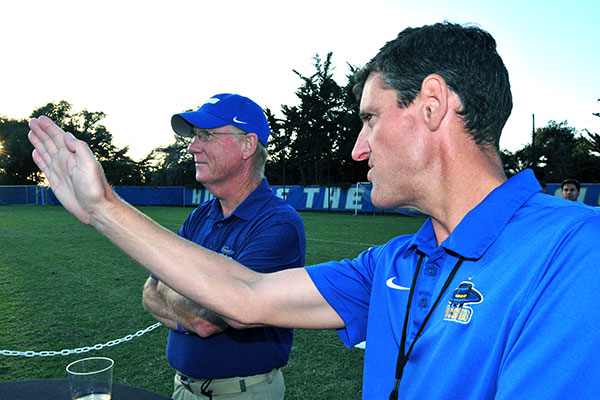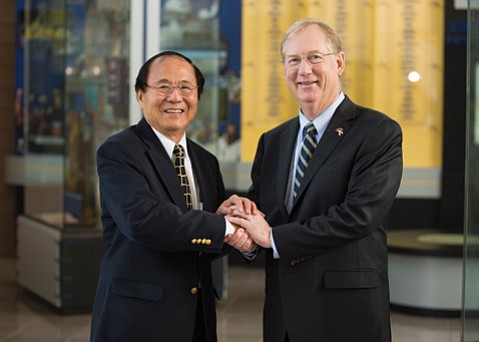
Senior Associate Athletics Director Andy Fee, foreground, shares some details about Harder Stadium with new UCSB Athletic Director John McCutcheon during UCSB’s first men’s soccer game of the season. (Presidio Sports Photo)
John McCutcheon gets started at UCSB with a history of making things happen as a college athletics administrator.
As a first-time Director of Athletics at Cal Poly in the 1990s, he helped the school make the transition from NCAA Division 2 to Division 1 and secure membership in the Big West Conference. In his 11 years of running the athletic department at the University of Massachusetts, he had a major role in getting facilities upgraded and new ones built.
UMass Chancellor Kumble R. Subbaswamy praised McCutcheon for his leadership.
“He cares deeply about our student-athletes and supported their success both on and off the field,” Subbaswamy said in a statement after McCutcheon announced he was leaving UMass for UCSB in January. “Under John’s leadership, our athletics program meets the highest standards of academic integrity. He has played a vital role in elevating the stature of our flagship campus.”
UCSB boosters hope the new Director of Athletics still has that Midas touch.
McCutcheon already has made some big moves in his first few months on the job. He fired women’s basketball coach Carlene Mitchell and hired Bonnie Henrickson from Kansas; signed baseball coach Andrew Checketts to a multi-year contract and secured a minor league stadium so the baseball team could host a NCAA Regional.
SPORTS FIGURE OF THE MONTH
Each Month, Presidio Sports recognizes a local
sports figure for their extraordinary contribution to
the Santa Barbara athletic community. It is our way to
recognize those who are making a lasting impact in
local sports, whether it is an inspirational
athletic performance, a lifetime achievement award,
or perhaps a great example of leadership.
McCutcheon learned the ropes of athletic administration at the University of Maine and Boston College. At Maine, he wore the hats of sports information director, assistant business manager and marketing guy for the department. He was the business manager for the Boston College athletic department, responsible for the ticket office, revenue sources and end-of-the-year budgets.
“That’s where I got a lot of my preparation,” he said.
McCutcheon, 61, is a tireless worker who loves his job. His track record shows he is a solid administrator who gets things done and gets it done the right way.
Presidio Sports talked to the head of Gaucho athletics as he enters his first full school year on the job at UCSB.
As you enter your first full year on the job, what goals have you set for yourself and the department?
First off, it’s been a great first five months on the job getting to know the staff and the external supporters, getting my arms around on how some of the processes work here better than when I came through the door. So, I think we’ve made a lot of progress in a fairly short period of time. Now that we look toward the start of the coming year, we definitely want to focus on our fundraising efforts and student-athlete support areas. In the first five months I’ve been able to work with the coaches and our business office and we’ve been able to develop formats for budgeting that the coaches know where we stand; there’s clarity, there’s transparency. That was a big first step because there wasn’t that clarity and understanding of where the whole budget process was, how it functioned with our external support. If there is one thing I heard when I was talking with our external people, it was this lack of confidence. If they made donations and if they provided support to the programs, was it actually getting to where they it wanted to go? We have to speak to that and we’ll continue to speak to that. But it starts with getting buy-in from the coaching staff internally so the messaging from here to our supporters is consistent. It’s pretty simple; it’s not rocket science. You just have to lay it out and be clear and communicate, and have a good exchange with the coaching staff as you move along. Now that we got that in place, we really want to focus on developing additional external support.
If you look at our total budget compared to others of the Big West Conference, we’re about in the middle. … Money is precious. It’s hard. There isn’t going to be a huge windfall of additional resources that just appear out of some place. If we want to do things to augment what we have now, we’re probably going to need to do it from external sources. We need to develop those. We need to have an approach that is organized, that builds in a more formal way a level of support we’re getting externally. We’re investing in that area now. We’re adding a staff position in our advancement area. We’re going to be up to five full-time people, plus myself, plus the coaches will participate. I really think it will give us the opportunity to have a lot more boots on the ground, making contacts, getting external people involved, excited about the program. And, ultimately, the plan is that it will lead to additional resources.

John McCutcheon with UC Santa Barbara chancellor Henry Yang. (Tony Mastres Photo/UCSB Athletics)
How do you feel about the relationship between UCSB intercollegiate athletics and the Santa Barbara community? What can you do to get more fans to games?
I think it’s good but I think it can always be better. You bring up attendance at events, that’s been a challenge across the country; that isn’t something that is unique to UCSB. If you look at different situations, particularly with student attendance, that’s been a challenge for a lot of folks. Of course, the more success you have — wins-and-loss-wise — that makes it easier. But we need to keep reaching out. We need to try and find ways to make it more inviting; that you get an experience there that you can’t get by just watching a game on TV.
Generally, I think we have pretty good relationship with the community. It’s just a matter of expanding it and enhancing it. I’m looking forward to soccer. I’ve heard a lot about it and the environment over there (at Harder Stadium), but I can’t wait to get a personal feel for it and see it myself.
You made your presence known by making some big moves in your first few months on the job: firing women’s basketball coach Carlene Mitchell and hiring Bonnie Henrickson to the position; securing the minor league Lake Elsinore Storm stadium as a host site for the NCAA baseball regionals; signing baseball coach Andrew Checketts to a contract extension. Can you take us through your process before making those decisions?
Well, sometimes I think when you come into a new situation you’re just presented with things you just have to deal with. It’s maybe not a conscious issue at the time in terms of a long-range plan but they are present and need attention. That was pretty much the situation that I walked into in regards to those specific situations. We knew we had a great coach in Andrew and wanted to do some things as I looked at his contract to protect him and protect us as well, and make it a better relationship over the long term going forward. Actually, the announcement you’re referring to was pretty much in place before I got here, but we did it again because I didn’t think we had some things in place that needed to be there. It was a real positive exchange. Of course, the success we had in baseball coming down the home stretch kind of amplified the need to get that addressed. I feel real good how we came out on that.
The women’s basketball situation, you never want to have to go through that; you never want to have to go through that as quickly as we did. But in talking with a lot of people here and analyzing the situation myself, I just felt that was something we needed to do for the long-term health of the program and get us in position back to where we were as quickly as we could. Those are probably the toughest things an AD has to do because they’re good people and they’re working hard. It just didn’t work out. We couldn’t be happier getting Bonnie on board. I think we were lucky to be in the right place at the right time. To get somebody with that kind of experience, her background and her expertise, I think it’s really going to work out well for us.
In the Lake Elsinore situation, it was a little outside of the box, but I guess I have kind of a history for that, being at UMass and playing football games at Gillette Stadium, which was an hour and half away. Just looking at how the team performed all year and knowing 3-4 weeks out it was likely we would get a No. 1 seed and knowing we couldn’t host it here under any circumstance, I didn’t want to take away their opportunity to have as close to a home advantage as we could. (Assistant athletic director) Tom Hastings and I sat down and started going through different venues as close to us, to see what might be available and Lake Elsinore was open. They have an affiliation with the San Diego Padres. Pat Graham, who is part owner of the Padres, made a call to (the Storm’s) general manager to see if they’d be interested in helping us out and helping us host. One thing led to another and it worked out great. There was a marginal risk financially. We actually outdrew the UCLA regional in terms of attendance. It was a big financial success. We turned over $100,000 to the NCAA after expenses. It really worked out well. For coach and players, it meant a lot to them. And look how it went: our regional champion (Virginia) won the national championship.
Let’s talk about the facilities at UCSB. What is the status of the much-needed swimming/water polo complex? How’s the progress on upgrades at the baseball stadium and Pauley Track? Will the Thunderdome ever get an upgrade?
Those are the things we’re focused on right now and we’re raising money. Starting with the Thunderdome, the component we’re looking at right from the top is the new floor. It won’t happen before this season but I feel very confident by next spring we’ll be replacing the floor at the Thunderdome.
We got several very positive proposals out there regarding baseball. It would be premature to really get into too much detail about it because I always look at these things until they’re a done deal they’re not a done deal. I don’t like to get hopes up too high with fans prematurely because it really does get folks frustrated. The pool facility and baseball in particular lights have been out there a long time. We have to find a way to reignite the enthusiasm about those projects.
Baseball is a little different because it can be done in components. We want to replace the field itself with an artificial surface that will be able to stand up to the use level we put on it, and not have the players do all the maintenance after every practice. They can go home and go to the library. That is a priority for us. Obviously, getting lights is a priority, then the entryway, all the support facilities — concessions and rest rooms. That can be done in phases. We can peck away at it.
The pool is a challenge because it’s an all-or-nothing scenario. The first step is probably a $10 million piece. Part of this advancement restructuring we’re doing is a step back and looking at where we are with that project, what the approach has been, really identify prospects in a business-plan type of approach and methodically go after it, so we have the right number of prospects identified that could help with the project. We bring our case for support and do it in a way that’s more in line with traditional fund raising that will get us where we want to go. I can’t tell you what the time line is on that. There is going to be a lot of work identifying prospects and people that we might go to and get excited about that project.
The track is moving forward. That’s being funded from student fees and a referendum that was passed. We had one meeting in the design process. Hopefully by this time next summer we’ll be in construction.
What do you hear from Gaucho boosters?
Our boosters are great and they want us to be as successful as we can be. They are passionate like fans at other institutions I’ve been at. I think they’re very proud of the caliber of student-athletes we have here and the fact we’ve done things the right way. My mantra is we want to be about three things: create the best possible experience we can athletically, academically and socially. We want to build winning programs, to say otherwise would be naïve; we’re not in this to just go play. We’re in Division 1 athletics, it’s competitive and we want to put ourselves in position to compete and we want to do it the right way. There are no shortcuts. We want to take care of things in the classroom, we want to make sure compliance issues are squared away, we want to be responsible in the recruiting process.
How did you get into college athletics administration?
When I was an undergraduate (at Indiana, Pa.), we hosted a state qualifier track meet and I got very involved in it and loved it. One of my assistant coaches told me about the program in sports administration at Ohio University; it was the only one out there at the time. I applied, got lucky and got into grad school in sports administration and one thing led to another.
Is UCSB going to have a women’s beach volleyball program?
I don’t see it anytime real soon. We don’t want to do it if we can’t do it the right way. We have additional resources we want to provide for the (indoor) team we have right now to put them more in a competitive situation.
When you bring it up for Santa Barbara to have beach volleyball, it’s a natural. But we don’t want to do it if we can’t do it the right way. We want to take care of some needs we have right now. Then we can take another look at it to see if makes sense for us.
What is the graduation rate for student athletes at UCSB?
82 percent.
What does John McCutcheon like to do outside of work?
Is there an outside of work? It is true to some degree — this is a 24-7 job. I had one of my bosses way back say, ‘Remember, what you do for a living is everybody else’s recreation. So when you’re out in the community and want to do something else, that’s all they want to talk about.’ You have to love the job.

